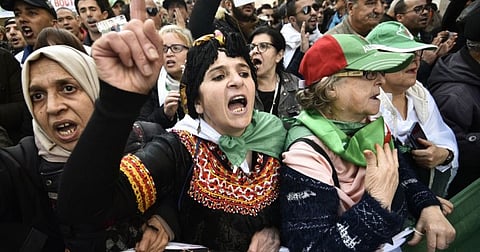Algeria A Model Of A State That Evades International Obligations, Controls Freedom: Experts At Symposium
Geneva, Nov 10 (TNA) The 41st session of the Universal Periodic Review mechanism this week discussed Algeria as a model of a state that evades international obligations and continues to confiscate rights and controls freedom of all kind.
The symposium was organized by the International Observatory IOPDHR- GENEVA, at the United Nations Human Rights Council in Geneva, in partnership with the international organization with consultative status PDES-NGO (Promotion of Economic and Social Development).
Throughout the event, the two NGOs presented the results of the joint report regarding the degree of compliance by the Algerian state with its international obligations under the Universal Periodic Review - the fourth cycle - in light of the recommendations made in May 2017.
The seminar was moderated by Björn Holtin, Swedish political advisor and expert in African affairs, who at the beginning expressed the importance of this international event as an opportunity to dwell on what has been done about the human rights situation, especially in the North African region, where democratic experiences vary from country to country and Algeria represents a model that has shirked its duties and obligations, due to numerous pending cases and unanswered special procedures correspondences, as well as suspended or obstructed international visits.
The Tindouf camps represent an exception in which the population is deprived of censuses, protection reports and refugee cards.
For his part, Oualid Kebir, Algerian political and human rights activist and president of the Maghreb Association for Peace, Cooperation and Development, addressed the challenges posed to the right to freedom of opinion and expression in Algeria by opening the burning file of demonstrators and activists of the movement, as well as the alarming resurgence of violations in the public and civil space; a situation that can only be described as dangerous, especially after the Algerian military regime added several amendments to the laws to legitimize abuses against human rights defenders, activists and journalists.
The Algerian regime has gone further, as Kebir asserted, by expanding the definition of the crime of terrorism, regardless of the state's obligations under international law, to harass human rights activists and bloggers and prosecute them on various charges such as incitement to assembly, intelligence with a foreign country, or contempt of state institutions.
On another topic, Hans Noot, Dutch expert in organizational behavior and organizational anthropology and member of the board of Human Rights without Borders in Brussels, highlighted the abnormal situation in the Tindouf camps and the gap recorded in relation to the standards of the 1951 Geneva Convention on Refugees, a situation that deviates from the rules of international law to remain frozen.
The Tindouf camps represent an exception in which the population is deprived of censuses, protection reports and refugee cards. A population victim of serious human rights violations, some of which amount to war crimes, far from the eyes and international vigilance and this by giving, on the part of the host country, the full mandate to an armed group to manage the camps and provide immunity.

